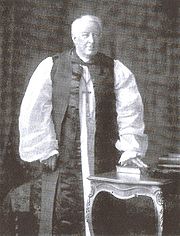
John Dowden
Encyclopedia

Irish people
The Irish people are an ethnic group who originate in Ireland, an island in northwestern Europe. Ireland has been populated for around 9,000 years , with the Irish people's earliest ancestors recorded having legends of being descended from groups such as the Nemedians, Fomorians, Fir Bolg, Tuatha...
cleric and ecclesiastical historian.
He was born in Cork in 1840 as the fifth of five children by John Wheeler Dowden and Alicia Bennett. His famous brother was the poet, professor and literary critic Edward Dowden
Edward Dowden
Edward Dowden , was an Irish critic and poet.He was the son of John Wheeler Dowden, a merchant and landowner, and was born at Cork, three years after his brother John, who became Bishop of Edinburgh in 1886. Edward's literary tastes emerged early, in a series of essays written at the age of twelve...
. Although his father was Presbyterian, John followed his mother by becoming an Anglican, although he attended both churches in his youth. When he was sixteen he became a student at Queen's College, Cork as a medical student. John began encountering health problems, problems which made it difficult to pursue his original career. In 1858, while contemplating a religious career, he enrolled at Trinity College, Dublin
Trinity College, Dublin
Trinity College, Dublin , formally known as the College of the Holy and Undivided Trinity of Queen Elizabeth near Dublin, was founded in 1592 by letters patent from Queen Elizabeth I as the "mother of a university", Extracts from Letters Patent of Elizabeth I, 1592: "...we...found and...
. He graduated in 1864 and was ordained as a deacon, moving to Sligo
Sligo
Sligo is the county town of County Sligo in Ireland. The town is a borough and has a charter and a town mayor. It is sometimes referred to as a city, and sometimes as a town, and is the second largest urban area in Connacht...
. In the same year he married, wedding a woman named Louisa Jones, by whom he would eventually father six children. John was ordained as a priest in 1865, and moved through a variety of positions slowly rising in prestige. John continued his studies and received a BD
Bachelor of Divinity
In Western universities, a Bachelor of Divinity is usually an undergraduate academic degree awarded for a course taken in the study of divinity or related disciplines, such as theology or, rarely, religious studies....
from Trinity College.
Scholarly work
John Dowden was also a rising scholar. In 1886 was elected as the AnglicanScottish Episcopal Church
The Scottish Episcopal Church is a Christian church in Scotland, consisting of seven dioceses. Since the 17th century, it has had an identity distinct from the presbyterian Church of Scotland....
Bishop of Edinburgh
Bishop of Edinburgh
The Bishop of Edinburgh is the Ordinary of the Scottish Episcopal Diocese of Edinburgh.The see was founded in 1633 by King Charles I. William Forbes was consecrated in St. Giles' Cathedral as its first bishop on 23 January 1634 though he died later that year...
, which position he held until his death in 1910. As a scholar, he was author of many works of thorough scholarship, including The Medieval Church in Scotland: its constitution, organisation and law (1910) and Bishops of Scotland: being notes on the lives of all the bishops, under each of the sees, prior to the Reformation (1912). Both were published posthumously by James Maclehose and Sons, Glasgow. The former, although extremely dated, is still regarded as one of the main starting points in medieval Scottish ecclesiastical history, and the latter remains to this day one of the most comprehensive guides to medieval Scottish episcopal prosopography
Prosopography
In historical studies, prosopography is an investigation of the common characteristics of a historical group, whose individual biographies may be largely untraceable, by means of a collective study of their lives, in multiple career-line analysis...
. An earlier work, The Workmanship of the Prayer Book: In Its Literary and Liturgical Aspects, (London: Methuen, 1899) remains an indispensable analysis of the background to and ethos of the Book of Common Prayer.

